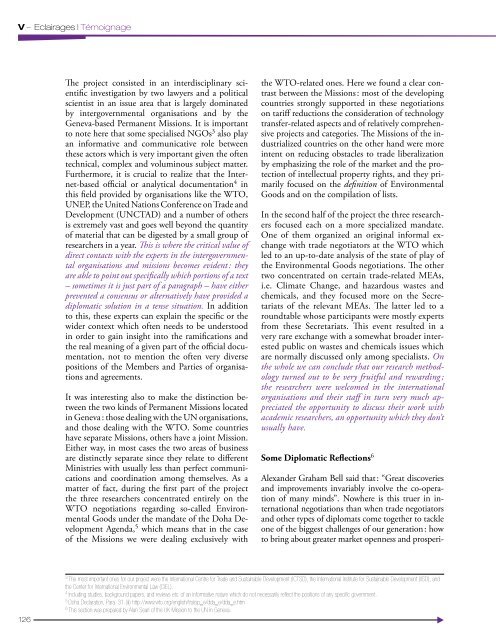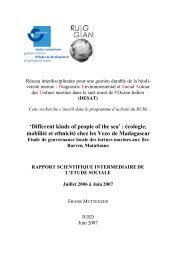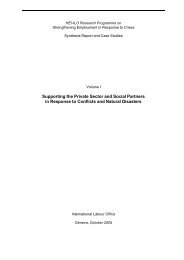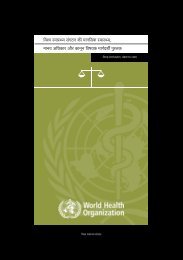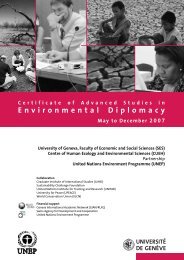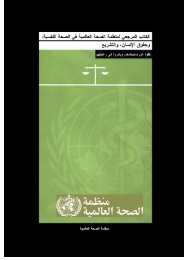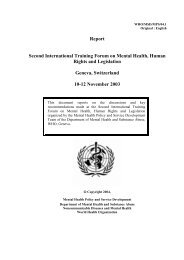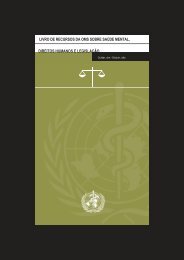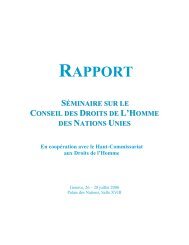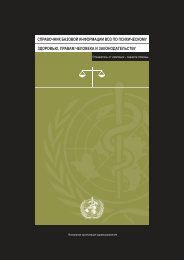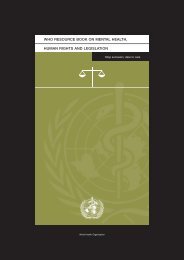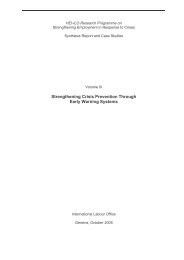Les liaisons fructueuses - RUIG-GIAN
Les liaisons fructueuses - RUIG-GIAN
Les liaisons fructueuses - RUIG-GIAN
You also want an ePaper? Increase the reach of your titles
YUMPU automatically turns print PDFs into web optimized ePapers that Google loves.
V – Eclairages | Témoignage<br />
The project consisted in an interdisciplinary scientific<br />
investigation by two lawyers and a political<br />
scientist in an issue area that is largely dominated<br />
by intergovernmental organisations and by the<br />
Geneva-based Permanent Missions. It is important<br />
to note here that some specialised NGOs 3 also play<br />
an informative and communicative role between<br />
these actors which is very important given the often<br />
technical, complex and voluminous subject matter.<br />
Furthermore, it is crucial to realize that the Internet-based<br />
official or analytical documentation 4 in<br />
this field provided by organisations like the WTO,<br />
UNEP, the United Nations Conference on Trade and<br />
Development (UNCTAD) and a number of others<br />
is extremely vast and goes well beyond the quantity<br />
of material that can be digested by a small group of<br />
researchers in a year. This is where the critical value of<br />
direct contacts with the experts in the intergovernmental<br />
organisations and missions becomes evident : they<br />
are able to point out specifically which portions of a text<br />
– sometimes it is just part of a paragraph – have either<br />
prevented a consensus or alternatively have provided a<br />
diplomatic solution in a tense situation. In addition<br />
to this, these experts can explain the specific or the<br />
wider context which often needs to be understood<br />
in order to gain insight into the ramifications and<br />
the real meaning of a given part of the official documentation,<br />
not to mention the often very diverse<br />
positions of the Members and Parties of organisations<br />
and agreements.<br />
It was interesting also to make the distinction between<br />
the two kinds of Permanent Missions located<br />
in Geneva : those dealing with the UN organisations,<br />
and those dealing with the WTO. Some countries<br />
have separate Missions, others have a joint Mission.<br />
Either way, in most cases the two areas of business<br />
are distinctly separate since they relate to different<br />
Ministries with usually less than perfect communications<br />
and coordination among themselves. As a<br />
matter of fact, during the first part of the project<br />
the three researchers concentrated entirely on the<br />
WTO negotiations regarding so-called Environmental<br />
Goods under the mandate of the Doha Development<br />
Agenda, 5 which means that in the case<br />
of the Missions we were dealing exclusively with<br />
the WTO-related ones. Here we found a clear contrast<br />
between the Missions : most of the developing<br />
countries strongly supported in these negotiations<br />
on tariff reductions the consideration of technology<br />
transfer-related aspects and of relatively comprehensive<br />
projects and categories. The Missions of the industrialized<br />
countries on the other hand were more<br />
intent on reducing obstacles to trade liberalization<br />
by emphasizing the role of the market and the protection<br />
of intellectual property rights, and they primarily<br />
focused on the definition of Environmental<br />
Goods and on the compilation of lists.<br />
In the second half of the project the three researchers<br />
focused each on a more specialized mandate.<br />
One of them organized an original informal exchange<br />
with trade negotiators at the WTO which<br />
led to an up-to-date analysis of the state of play of<br />
the Environmental Goods negotiations. The other<br />
two concentrated on certain trade-related MEAs,<br />
i.e. Climate Change, and hazardous wastes and<br />
chemicals, and they focused more on the Secretariats<br />
of the relevant MEAs. The latter led to a<br />
roundtable whose participants were mostly experts<br />
from these Secretariats. This event resulted in a<br />
very rare exchange with a somewhat broader interested<br />
public on wastes and chemicals issues which<br />
are normally discussed only among specialists. On<br />
the whole we can conclude that our research methodology<br />
turned out to be very fruitful and rewarding ;<br />
the researchers were welcomed in the international<br />
organisations and their staff in turn very much appreciated<br />
the opportunity to discuss their work with<br />
academic researchers, an opportunity which they don’t<br />
usually have.<br />
Some Diplomatic Reflections 6<br />
Alexander Graham Bell said that : “Great discoveries<br />
and improvements invariably involve the co-operation<br />
of many minds”. Nowhere is this truer in international<br />
negotiations than when trade negotiators<br />
and other types of diplomats come together to tackle<br />
one of the biggest challenges of our generation : how<br />
to bring about greater market openness and prosperi-<br />
126<br />
3. The most important ones for our project were the International Centre for Trade and Sustainable Development (ICTSD), the International Institute for Sustainable Development (IISD), and<br />
the Center for International Environmental Law (CIEL).<br />
4. Including studies, background papers, and reviews etc. of an informative nature which do not necessarily reflect the positions of any specific government.<br />
5. Doha Declaration, Para. 31.(iii) http://www.wto.org/english/tratop_e/dda_e/dda_e.htm<br />
6. This section was prepared by Alan Searl of the UK Mission to the UN in Geneva.


